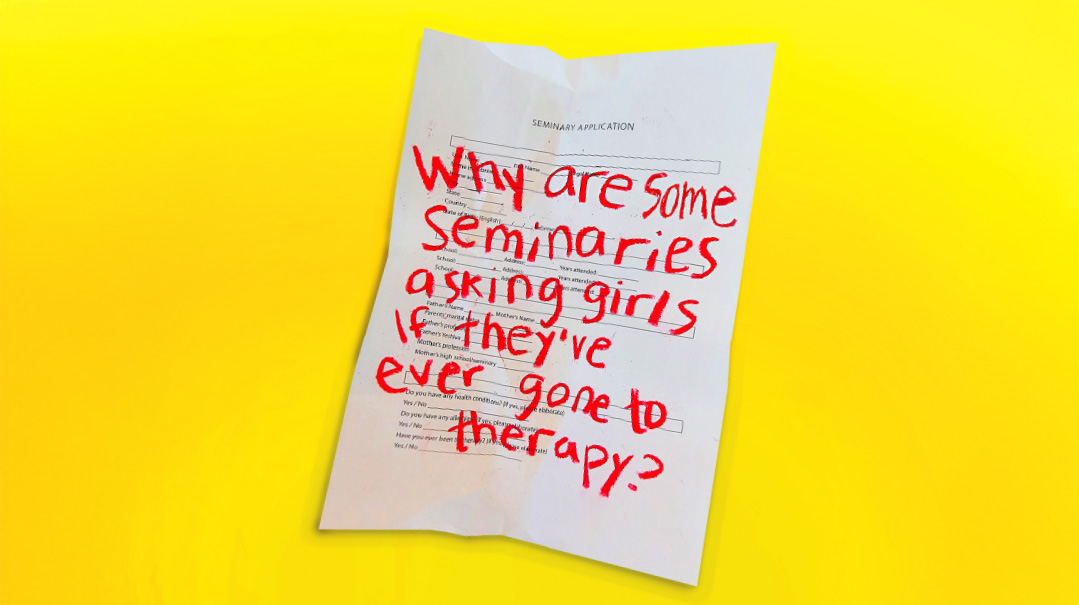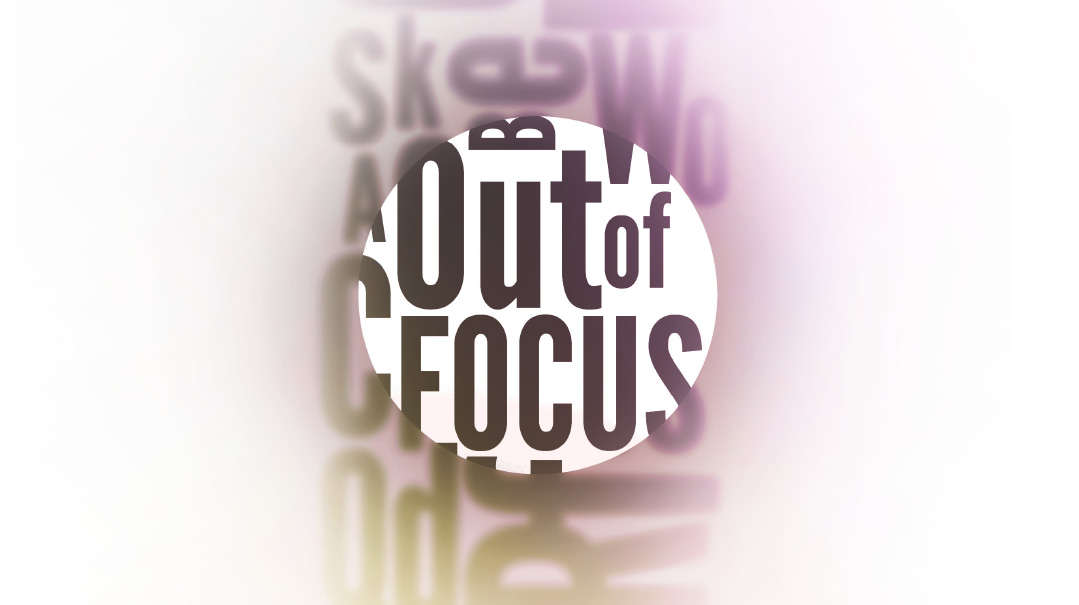Can This Marriage Be Fixed? The Conversation Continues

“I don’t know why marrying for love and friendship is considered a negative or secular ideal”

Too Complex for Conjecture
Elisheva Liss
I wanted to clarify that I intended for my piece “Please Don’t Marry Off Your Children” to be a stand-alone message, and not an explanation for early divorces.
When I’m asked to give reasons for what seems to many like an increase in early divorces, I’m always careful to answer that I don’t know of good data on the numbers or reasons for divorce.
In working with couples, I see different areas of general struggle, but when it comes to trying to pinpoint why certain kinds of divorces happen, I feel that some matters are too important, complex, and sensitive for casual speculation.
Every divorce is an individualized, subjective experience affecting real people, often traumatic, and I would never want my writing to be perceived as trying to reduce such a painful phenomenon to generalized social conjecture.
My belief is that people should be encouraged to choose marriage partners from an educated and empowered place, not because the reverse is causing early divorces (it may or may not be; I have no knowledge of any evidence-based correlation there one way or another), but because it’s morally and halachically correct for marriage to be an informed, autonomous choice.
Married to a Monster
Name Withheld
I was at a bar mitzvah recently when I overheard someone say, “You know why divorcées don’t get more financial support? Because if they did, more people would get divorced.”
I froze.
As if this life — this grief, this humiliation, this constant uphill battle — is something people choose for convenience. As if a woman would walk away from the dream of a whole home, a complete family, a warm Shabbos table… all for a check. As if financial support could ever erase the trauma, the shattered sense of safety, the ache of raising children alone through brokenness.
What they don’t realize is this: Many women don’t leave dangerous homes, but not because they want to stay. It’s because they know that when they do, there will be no support. No safety net. Just judgment.
I didn’t choose this life. I survived it.
I had a dream once — a very different dream. I imagined a home filled with laughter and light, children in their Shabbos best, zemiros floating through the dining room, and a husband at the head of the table, proud and kind. What I got instead was a silent war disguised as family life.
Shabbos in our home was fear wrapped in formality. The kids weren’t allowed to smile at the table. If they dared to, even for just a quiet giggle between siblings, they were immediately sent to time-out. During zemiros, they were required to sit stone-still, their eyes locked on him. If their gaze wandered or their expression slipped, the consequences were harsh. One Shabbos, my youngest was dragged from the dining room just for shifting in his seat. The scrape of a chair leg was all it took to set him off.
And then there were the parshah questions. Every week, my son brought them home, hoping they would be seen as a reflection of his effort. But in our house, they became a tool of shame. In bold, red letters, his father would scrawl: “Really disappointed”; “Did not hold with my davening”; “Did not sit nicely. Very, very disappointing.”
Week after week. Year after year. My son would scrunch the paper at the bottom of his schoolbag, hiding it beneath homework and snacks. The moment he stepped outside the house, he’d toss it in the garbage. He knew exactly what it was — a weapon disguised as a comment. It was meant to humiliate him. But the child knew better. And he refused to carry that shame one step further than he had to.
It wasn’t only Shabbos. During supper one evening, my daughter — just eight years old — got up to pour herself a glass of water. A single drop spilled on the floor. That was all it took. He erupted, hurling vile, obscene names at her as though she were his enemy. My daughter curled into a ball, sobbing. I wanted to run to her, but I was frozen. Because I knew: If I moved, we’d both pay for it.
Do you know what it’s like to live with the constant adrenaline of another explosion? The kind that simmers just under your skin — always bracing, always anticipating? To tread on eggshells in your own kitchen, never knowing what sound, glance, or word will set it off?
Smiles one minute. All-out war the next. Never a warning. Never a clue of when it might hit.
My children would daven on the school bus, praying that each day would be quiet. That when they walked through the front door, there wouldn’t be yelling. Or objects flying. Or doors slammed so hard the walls trembled. They weren’t asking for joy. Just peace. Just quiet.
We tried therapy, again and again. I searched for someone who would validate what we were living through, who would help me make sense of the chaos. I sent my children, praying someone would step in. And their therapists — they knew. They saw. They wrote meticulous notes. I read some of them later: “Child exhibits signs of home instability”; “Emotional distress triggered by family dynamic.” But none of them wanted to get involved. None of them reported. None of them reached out. It was easier to treat the symptoms than name the source.
So we were left to survive it ourselves.
And still, I stayed. Because he convinced me I had no one. He was so charming, so polite, so normal outside our home. People saw him smiling, making small talk, shaking hands warmly. He’d tell the children, “I have so many friends. Mommy has none.” And I believed him. I truly thought that if I left, no one would support me. That people would judge me, whisper about me, pity me — or worse, blame me.
Financial abuse was part of the picture, too. I worked tirelessly to keep a roof over our heads, to give my kids stability and some sense of a future. Meanwhile, he lavished himself with luxuries — first-class airline tickets, designer items, the best of everything. Yet he couldn’t hold down a steady job. There was never money for school supplies, new shoes, or camp tuition, but there was always money for him. Always money for his image.
When I finally left, it wasn’t because I had the resources. It was because I had no other choice. My children’s mental health and safety were unraveling before my eyes. Staying was no longer survivable. So I ran — with no child support, no plan, no backup. Just the burning need to escape.
And that’s why those words at the bar mitzvah hit me so hard. “If we give financial support, more people will get divorced.” As if anyone chooses this life for comfort. As if support would create an epidemic of broken homes, when in truth, it’s the lack of support that keeps people trapped in dangerous ones.
As Dr. David Lieberman wisely said at an event I attended, “Don’t ask an abused spouse what took them so long to leave. Leaving at all is a miracle.”
And that miracle? It doesn’t come with celebration. It comes with loneliness. With judgment. With years of painful healing, of starting over from scratch while pretending to be strong for the sake of your children.
But now I know — I do have friends. People who see, who understand, who would have helped if they only knew how. And maybe, if we speak up more — if we tell the truth of what this life is really like — maybe next time, someone else will feel strong enough to leave sooner. And maybe next time, they won’t have to do it alone.
So excuse me when I cringe at yet another fundraiser that lands in my inbox or is passed around the shul. “This poor mother,” the caption says. “She needs help making bar mitzvahs, weddings, paying tuition.” And yes — she does. But so do we. We, the silent ones. The ones who left. We’re making those same simchahs — alone. Without fanfare. Without pity. Just pain.
Because after all, they say, we chose to leave.
I’m Grateful My Parents Married Me Off
Name Withheld
I enjoy the perspective your articles bring on all sorts of topics. I did, however, feel judged in the recent article regarding young divorce. The way “people who marry spouses they don’t know well” were lumped together with people who are pressured into marriage was an unfair portrayal of the communities it described, particularly the chassidish one. I felt it played into the stereotype that chassidim have “arranged marriages” in which the children have no choice in the matter. I, and most people I know, were given a choice in both whom to marry, and how many times to meet before getting engaged. I understand the point was to educate parents in how to navigate the shidduch process in a way that will lead to the best outcome. However, there are parents across the spectrum who make mistakes. It’s not necessary to point fingers at any group. As far as the term “marrying off children” — my parents found me someone suitable to marry, helped me find an apartment, paid for my wedding, and more. So yes, my parents “married me off,” and I’m very grateful!
Love Has a Role
Young, divorced, and (gasp!) looking for love
I’m glad I read the article all the way through before sitting down to write a response because Elisheva Liss’s article was brilliant and took the edge off the frustration I felt at the rest of it.
The claim that today’s “disposable generation” is “less resilient, less likely to work hard” is exaggerated at best, and perpetuates a harmful narrative that invalidates the experience of thousands of divorcees at worst. As there’s no actual data that anyone can use to make definitive claims regarding this topic, I wonder where the contributors took this idea from. Have they personally spoken to multiple young couples who told them that they don’t want to work on their marriage, or did they hear of a young couple that divorced after a few months, mixed in some one-sided rumors, and jumped to their own assumptions?
The anecdotal evidence I see from divorced people I know, including myself, is that no couple, or at least not nearly as many as the chatter on the street would make you believe, is getting divorced because they’re lazy or unwilling to put in some work. It’s true that some divorces today don’t always have a big, dramatic reason such as abuse or mental illness. Sometimes it’s because they feel down to their bones that the person they married isn’t who they’re supposed to spend the rest of their life with, perhaps due to clashing personalities, hashkafos, or a myriad of other factors that might not align. Although to some people that might not sound like a reason enough to divorce, to some of us the thought of staying in such a marriage is unfathomable.
Yes, today’s generation has different needs and wants in marriage, and the sooner the older generation stops trying to turn the clock back 60 years, the sooner we can actually start working on solutions and better prepare our young adults for marriage. The post-Holocaust generation and their children had very different priorities and goals for marriage; maybe we should be grateful that our nation is healing, that our young adults are now more emotionally developed and attuned to themselves and others and therefore want more out of a marriage.
Lastly, in response to the claim that a Torah-true marriage is one where love is an outgrowth of marriage and the “proof” of Yitzchak marrying Rivkah before he loved her, I find it very off-putting when random, often out-of-context pesukim from the Torah are weaponized to further an agenda. This specific example is especially ironic given that a little bit later in Vayeitzei it’s written that Yitzchak’s own son Yaakov, “loved Rochel and said to Lavan, ‘I will work for you for seven years for Rochel, your younger daughter.’” He loved her, worked seven years for her, married her, and then worked seven more years for her. Who’s to say which of those, if any, are meant as a guideline for how we should approach marriage?
I don’t know why marrying for love and friendship is considered a negative or secular ideal; marriage is supposed to be a metaphor for our relationship with Hashem, and I think Hashem would want our real-life metaphors to be filled with the passion and love we aspire to have with Him. The world runs on love; between parents and children, between husband and wife, between Hashem and us. Yes, one of the main goals of a Jewish marriage is to grow together, build a Jewish home, and teach our children about Yiddishkeit. But that’s not to say that we can’t also look for friendship, for chemistry, for that elusive spark, in a potential spouse as well.
It’s a Delicate Balance
A Reader Who Cares
Thank you for all the work you put in to publish an informative, entertaining, and inspirational publication. What you bring to the Jewish community weekly and the impact you have is great. Therefore, seeing the cover feature on Family First left me deeply pained.
Writing about divorce, or any sensational, sensitive topic, is always a delicate balance. You want to keep it informative and truthful, yet objective and neutral. However, the very topic of divorce is not objective. It’s two individuals. Two thinking, feeling, human beings, each experiencing this tremendous challenge through their own perception and perspective. No two people are alike and therefore, no two experiences or stories will be the same. When an entire feature analyzes the reasons, breaks it down to the hows and whys, data, statistics, studies, experts’ opinions, it only exacerbates the judgment and doubt that these individuals already face daily.
If someone is in this place, in this position, it means there was no choice — this was their only choice. Hashem chose them to go through this painful process. When we break it down and list reasons, we take Hashem completely out of the picture.
This article added pain and increased the stigma instead of acknowledging the gadlus of these individuals; the immense effort and courage it takes in facing the world and believing, trusting, living once more, and how they do choose to face this challenge — because that, unlike the place they’re in, IS a choice.
No one gets divorced without thinking it through — thinking of the effects it will have on their parents, families, siblings, and on their future. No one chooses this. No one wants this. If someone is there, it’s because they had no other choice. As T. Greenbaum so clearly wrote, “Indeed, divorce is not the easy way out… if someone believes that they need to take this step, obviously after consulting daas Torah, it’s definitely not going to be an easy decision and definitely not for a silly, unimportant reason. It can’t be.”
To blame abuse, mental illness, addiction, gambling, Yiddishkeit issues, isn’t fair, and quite frankly, isn’t true. There are many couples dealing with the issues listed who are happily married and raising beautiful families, while there are people who had to get divorced due to reasons no one would ever dream of.
Core Message
Mrs. Leah Richeimer, Author of Marriage Secrets
I was gratified to see Mishpacha address the critical issue of our rising divorce rate. The coverage was insightful and on point. Still, I feel compelled to add one foundational cause that often goes unspoken. Despite having worked in the field of shalom bayis for decades, every divorce I hear about is still a punch to the gut. I’ve been teaching nonstop and training shalom bayis teachers around the world, yet I often wonder: If I could have spread this one core message to one more home, could a needless divorce have been prevented?
And what is this core message? I suspect you’ll nod in agreement when you hear it. Ask a random frum woman in the market about our mesorah for kashrus, and she can talk your ear off for hours. The same goes for Shabbos. But how many of us truly know our mesorah for shalom bayis? Do we even realize that there is a mesorah for it? Are we confident that our approach to marriage is deeply rooted in Torah, or have secular ideas quietly crept in and shaped our ideals, expectations, and behaviors? Without a strong foundation in our Torah-based shalom bayis teachings, sadly, we shouldn’t be surprised by today’s heartbreaking divorce rate. Torah is our only true antidote. The more we learn it, live it, and teach it, the better chance we have at reversing this devastating trend.
Tragically, some marriages must end in divorce, but many thousands are just lacking sufficient information and education. This education must start early. In schools, homes, and communities. Rav Shmuel Kamenetsky told me that shalom in the world starts with shalom bayis. Perhaps this focus is the ultimate key to bringing Mashiach speedily in our days.
Not a New Concept
Vichna Belsky, BS, Certified Life Coach
There is a troubling line early in the article attributed to Rena Cohen*: “Bear in mind that marriage for love is a new concept, originating in the early 20th century; before that, couples used to marry for economic or practical reasons.”
The Torah speaks numerous times about the love between a husband and wife. The entire Shir Hashirim is a metaphor based on love between spouses as a parable for the love between Hashem and us. According to the Rambam, a husband and wife have obligations to each other that sure look like manifestations of love. Jewish marriage has always been and continues to be a place to learn and grow and give and love and develop.
Marriage for love is not a new concept in Torah Judaism.
(Originally featured in Family First, Issue 952)
Oops! We could not locate your form.







